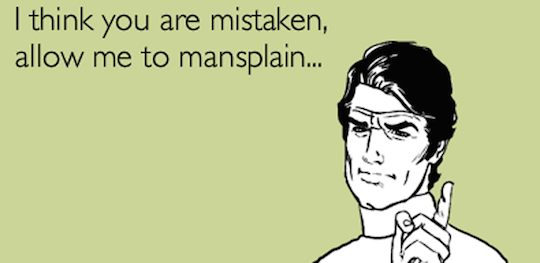Yesterday, Fredrik deBoer posted this long and thoughtful essay on a phenomenon he calls “critique drift.” I assume the internet hates him now. You should read the whole piece, but deBoer nicely summarizes his own argument in this passage:
Critique drift is the phenomenon in which a particular critical political lens that correctly identifies a problem gets generalized and used less and less specifically over time. This in turn blunts the force of the critique and ultimately fuels a backlash against it. Critique drift is a way that good political arguments go bad.
DeBoer cites three concepts from the rhetoric of social justice/intersectionality that reflect critique drift: mansplaining, tone policing, and gaslighting. Note that he does not say these phenomena aren’t real—only that the lefty internet increasingly uses them in contexts where they don’t apply.
That kind of nuance—deBoer believes mansplaining is a thing, but he also believes the term is often used irresponsibly—is precisely the kind of nuance critique drift is in danger of erasing. Consider the drift in what it means to mansplain.
In its proper1 usage, mansplaining refers to when a man explains to a woman her own area of expertise. That last part is important: it captures the institutionalized bias makes that makes men think mere masculinity confers an authority equal to a woman’s background, education and experience.
Mansplaining does not refer to any situation in which a man argues with a woman. Consider the difference between these two posts from the Tumblr Academic Men Explain Things to Me.
In this post, a woman attending a conference meets a man who explains to her basic information about her academic subfield. This is a pretty clear-cut instance of mansplaining: the woman has formal training in a particular area and almost certainly knows more about it than the man speaking to her, yet the man holds forth anyway. The key element here is disparity in expertise. The man should recognize that disparity and listen more than he talks, but he doesn’t—probably because he unthinkingly regards himself as wiser than any woman.
Although this post appears in the same Tumblr, it is not an instance of mansplaining, because there is no expertise disparity. A 15 year-old girl sees Men In Black 3 and likes it. Her male friend, presumably a teenage boy, says Men In Black 3 sucks and Prometheus is a “real movie.” What’s missing from this purported case of mansplaining is the gap in authority that characterizes the preceding example. Neither of these people has any particular expertise in movies.2 They’re just a man and a woman arguing.
DeBoer argues convincingly that such sloppy use of mansplaining and similar terms A) weakens the rhetoric of social justice generally and B) stokes a backlash. He cites trigger warnings as an example. Once a thoughtful way to avoid re-traumatizing people who suffer from the narrowly defined medical condition of post-traumatic stress disorder, trigger warnings have become a performance of orthodoxy.
Consider Melissa McEwan’s Shakesville blog, which used to put trigger warnings at the beginning of nearly every post. In a testament to the degradation of the original term, she now uses “content notes,” but they retain their tone of pious rectitude. It seems unlikely that anyone would suffer a psychological episode as a result of reading about “hostility to agency.” It seems more likely that McEwan deploys these content notes to remind her reader that she is very considerate and aware.
It also seems likely that the disdain for trigger warnings one develops after seeing them used in this way might encourage people to conflate the needs of actual PTSD victims with the complaints of people who are just easily upset. DeBoer articulates this problem nicely:
Some of the most privileged college students in the world now feel no compunction against invoking triggers at any time they find it convenient. Anyone who questions whether they actually deserve to invoke that claim, meanwhile, is regarded as inherently a bad ally and bad person. This, in turn, compels some people to think that all talk of triggers and trigger warnings is academic lefty bullshit that leaves us unable to educate, unable to ever bring students to encounter any remotely challenging or controversial opinions, and makes conservative backlash that much more likely.
We should resist critique drift, in other words, because the critique is valuable. To abuse it is to reduce its efficacy when we really need it. Social justice advocates and other people on the left should take this issue seriously, because it has the potential to undermine decades of important work. Winning an argument about movies might not be worth that.




